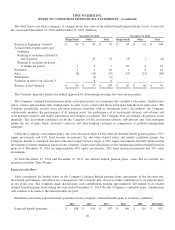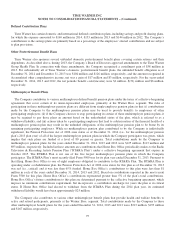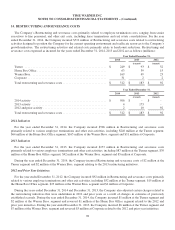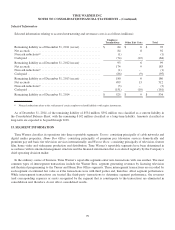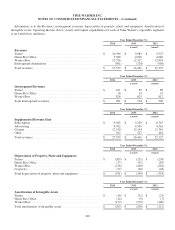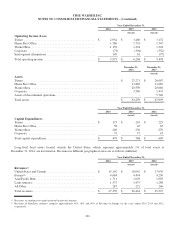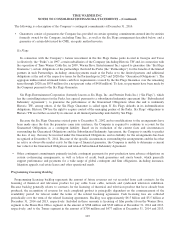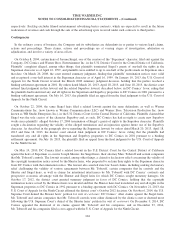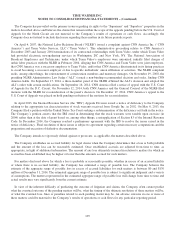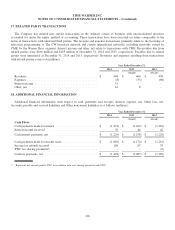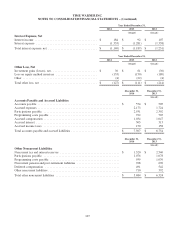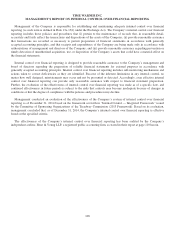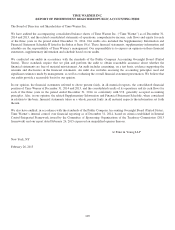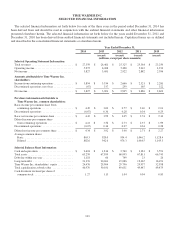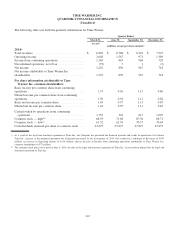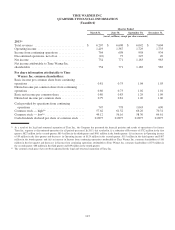Time Magazine 2014 Annual Report Download - page 121
Download and view the complete annual report
Please find page 121 of the 2014 Time Magazine annual report below. You can navigate through the pages in the report by either clicking on the pages listed below, or by using the keyword search tool below to find specific information within the annual report.TIME WARNER INC.
NOTES TO CONSOLIDATED FINANCIAL STATEMENTS – (Continued)
The Company has prevailed on the primary issues regarding its rights to the “Superman” and “Superboy” properties in the
matters described above and believes the claims that remain within the scope of the appeals pending before the U.S. Court of
Appeals for the Ninth Circuit are not material to the Company’s results of operations or cash flows. Accordingly, the
Company does not intend to include disclosure regarding these matters in its future periodic reports.
On April 4, 2007, the National Labor Relations Board (“NLRB”) issued a complaint against CNN America Inc. (“CNN
America”) and Team Video Services, LLC (“Team Video”). This administrative proceeding relates to CNN America’s
December 2003 and January 2004 terminations of its contractual relationships with Team Video, under which Team Video
had provided electronic newsgathering services in Washington, DC and New York, NY. The National Association of
Broadcast Employees and Technicians, under which Team Video’s employees were unionized, initially filed charges of
unfair labor practices with the NLRB in February 2004, alleging that CNN America and Team Video were joint employers,
that CNN America was a successor employer to Team Video, and/or that CNN America discriminated in its hiring practices
to avoid becoming a successor employer or due to specific individuals’ union affiliation or activities. The NLRB complaint
seeks, among other things, the reinstatement of certain union members and monetary damages. On November 19, 2008, the
presiding NLRB Administrative Law Judge (“ALJ”) issued a non-binding recommended decision and order, finding CNN
America liable. On September 15, 2014, a three-member panel of the NLRB affirmed the ALJ’s decision and adopted the
ALJ’s order with certain modifications. On September 16, 2014, CNN America filed a notice of appeal with the U.S. Court
of Appeals for the D.C. Circuit. On November 12, 2014, both CNN America and the General Counsel of the NLRB filed
motions with the NLRB for reconsideration of the panel’s decision. On December 17, 2014, CNN America’s appeal to the
U.S. Court of Appeals was placed on hold pending resolution of the motions for reconsideration.
In April 2013, the Internal Revenue Service (the “IRS”) Appeals Division issued a notice of deficiency to the Company
relating to the appropriate tax characterization of stock warrants received from Google Inc. in 2002. On May 6, 2013, the
Company filed a petition with the United States Tax Court seeking a redetermination of the deficiency set forth in the notice.
The Company’s petition asserts that the IRS erred in determining that the stock warrants were taxable upon exercise (in
2004) rather than at the date of grant based on, among other things, a misapplication of Section 83 of the Internal Revenue
Code. In December 2014, the Company reached a preliminary agreement with the IRS to resolve the issues raised in the
notice of deficiency. Final resolution of these issues is subject to agreement regarding certain necessary computations and the
preparation and execution of definitive documentation.
The Company intends to vigorously defend against or prosecute, as applicable, the matters described above.
The Company establishes an accrued liability for legal claims when the Company determines that a loss is both probable
and the amount of the loss can be reasonably estimated. Once established, accruals are adjusted from time to time, as
appropriate, in light of additional information. The amount of any loss ultimately incurred in relation to matters for which an
accrual has been established may be higher or lower than the amounts accrued for such matters.
For matters disclosed above for which a loss is probable or reasonably possible, whether in excess of an accrued liability
or where there is no accrued liability, the Company has estimated a range of possible loss. The Company believes the
estimate of the aggregate range of possible loss in excess of accrued liabilities for such matters is between $0 and $130
million at December 31, 2014. The estimated aggregate range of possible loss is subject to significant judgment and a variety
of assumptions. The matters represented in the estimated aggregate range of possible loss will change from time to time and
actual results may vary significantly from the current estimate.
In view of the inherent difficulty of predicting the outcome of litigation and claims, the Company often cannot predict
what the eventual outcome of the pending matters will be, what the timing of the ultimate resolution of these matters will be,
or what the eventual loss, fines or penalties related to each pending matter may be. An adverse outcome in one or more of
these matters could be material to the Company’s results of operations or cash flows for any particular reporting period.
105



